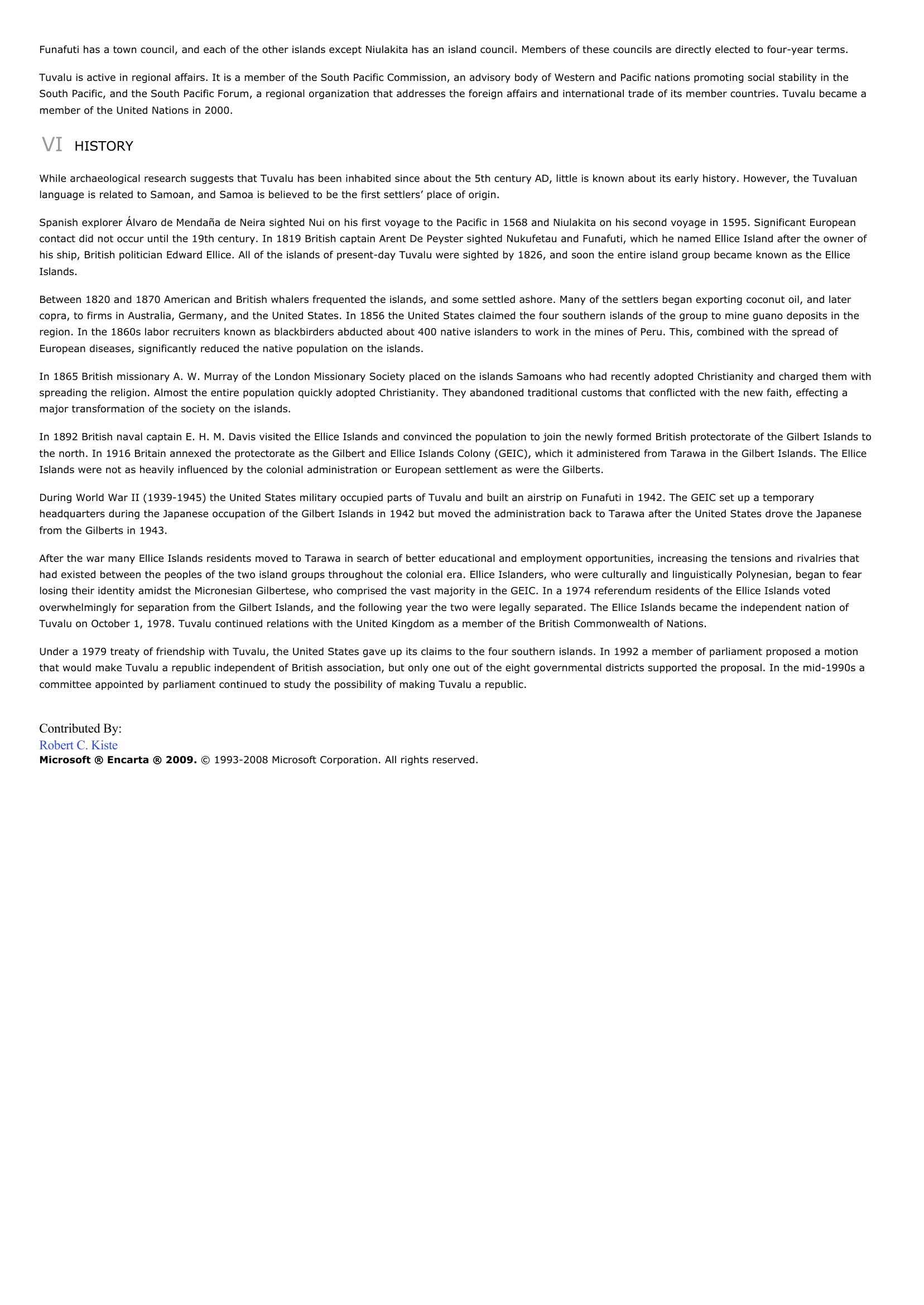Tuvalu - country.
Publié le 04/05/2013

Extrait du document
«
Funafuti has a town council, and each of the other islands except Niulakita has an island council.
Members of these councils are directly elected to four-year terms.
Tuvalu is active in regional affairs.
It is a member of the South Pacific Commission, an advisory body of Western and Pacific nations promoting social stability in theSouth Pacific, and the South Pacific Forum, a regional organization that addresses the foreign affairs and international trade of its member countries.
Tuvalu became amember of the United Nations in 2000.
VI HISTORY
While archaeological research suggests that Tuvalu has been inhabited since about the 5th century AD, little is known about its early history.
However, the Tuvaluan language is related to Samoan, and Samoa is believed to be the first settlers’ place of origin.
Spanish explorer Álvaro de Mendaña de Neira sighted Nui on his first voyage to the Pacific in 1568 and Niulakita on his second voyage in 1595.
Significant Europeancontact did not occur until the 19th century.
In 1819 British captain Arent De Peyster sighted Nukufetau and Funafuti, which he named Ellice Island after the owner ofhis ship, British politician Edward Ellice.
All of the islands of present-day Tuvalu were sighted by 1826, and soon the entire island group became known as the ElliceIslands.
Between 1820 and 1870 American and British whalers frequented the islands, and some settled ashore.
Many of the settlers began exporting coconut oil, and latercopra, to firms in Australia, Germany, and the United States.
In 1856 the United States claimed the four southern islands of the group to mine guano deposits in theregion.
In the 1860s labor recruiters known as blackbirders abducted about 400 native islanders to work in the mines of Peru.
This, combined with the spread ofEuropean diseases, significantly reduced the native population on the islands.
In 1865 British missionary A.
W.
Murray of the London Missionary Society placed on the islands Samoans who had recently adopted Christianity and charged them withspreading the religion.
Almost the entire population quickly adopted Christianity.
They abandoned traditional customs that conflicted with the new faith, effecting amajor transformation of the society on the islands.
In 1892 British naval captain E.
H.
M.
Davis visited the Ellice Islands and convinced the population to join the newly formed British protectorate of the Gilbert Islands tothe north.
In 1916 Britain annexed the protectorate as the Gilbert and Ellice Islands Colony (GEIC), which it administered from Tarawa in the Gilbert Islands.
The ElliceIslands were not as heavily influenced by the colonial administration or European settlement as were the Gilberts.
During World War II (1939-1945) the United States military occupied parts of Tuvalu and built an airstrip on Funafuti in 1942.
The GEIC set up a temporaryheadquarters during the Japanese occupation of the Gilbert Islands in 1942 but moved the administration back to Tarawa after the United States drove the Japanesefrom the Gilberts in 1943.
After the war many Ellice Islands residents moved to Tarawa in search of better educational and employment opportunities, increasing the tensions and rivalries thathad existed between the peoples of the two island groups throughout the colonial era.
Ellice Islanders, who were culturally and linguistically Polynesian, began to fearlosing their identity amidst the Micronesian Gilbertese, who comprised the vast majority in the GEIC.
In a 1974 referendum residents of the Ellice Islands votedoverwhelmingly for separation from the Gilbert Islands, and the following year the two were legally separated.
The Ellice Islands became the independent nation ofTuvalu on October 1, 1978.
Tuvalu continued relations with the United Kingdom as a member of the British Commonwealth of Nations.
Under a 1979 treaty of friendship with Tuvalu, the United States gave up its claims to the four southern islands.
In 1992 a member of parliament proposed a motionthat would make Tuvalu a republic independent of British association, but only one out of the eight governmental districts supported the proposal.
In the mid-1990s acommittee appointed by parliament continued to study the possibility of making Tuvalu a republic.
Contributed By:Robert C.
KisteMicrosoft ® Encarta ® 2009. © 1993-2008 Microsoft Corporation.
All rights reserved..
»
↓↓↓ APERÇU DU DOCUMENT ↓↓↓
Liens utiles
- LA MUSIQUE COUNTRY
- Country- und Western-Musik - Musik.
- Tuvalu.
- Pays noir, en anglais Black Country, terme imagé désignant les régions industrielles fondées sur l'extraction du charbon depuis l'époque de la révolution industrielle.
- Tuvalu - geographie.


